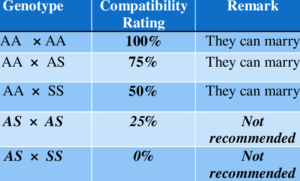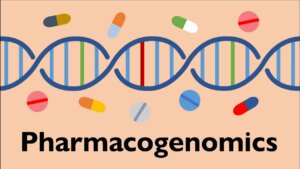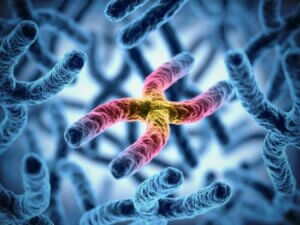Share this blog post with your friends
Genotype testing is a test that examines an individual’s genetic makeup. It involves looking for changes called variations/ mutations in the DNA of an individual.
It may take two to a few weeks to get the results of a genotype test from the day the test was carried out. This test also helps medical professionals to detect other health problems that are capable of causing risk, later on in the future.
The early form began in the 1950s which involved counting the number of chromosomes per cell. Throughout its record, genotype testing has evolved from fundamental to experienced techniques, giving a much broader understanding of human health.
In this article, we will cover the importance of genotype testing, types of genotype testing, and genetic markers.

Source: Health Digest
TYPES OF GENETIC TESTING
There are different types of genetic tests for different reasons and each of these testing has its specific applications. They include;
1. Diagnostic testing
This is a test carried out to confirm a genetic condition that’s been questioned. It analyzes specific genes known to be associated with the condition. It can be used to test for cystic fibrosis, Huntington’s disease, and sickle cell anemia.
2. Predictive testing
This is carried out to assess one’s risk of developing or contracting some diseases. This type of testing helps individuals to adopt certain lifestyle changes. It detects specific gene mutations that are likely to cause diseases such as Cancer, heart disease, etc.
3. Carrier testing
This is done to know the tendency of passing on genetic abnormalities from parents to offspring. Carriers of gene mutation don’t normally show symptoms but tend to pass such mutations to offerings.
4. Pharmacogenetic testing
This is carried out to predict an individual’s response to specific medications. This will help health professionals in optimizing treatment options and drugs given to an individual.
5. Prenatal testing
This test is carried out during pregnancy to know the genetic status of the fetus. Screening and diagnosis are carried out to check for any abnormalities. This test also helps the parents to make certain decisions for better health management.
6. Nutrigenetic testing
This test is done to identify an individual’s response to certain nutrients and dietary supplements. With this testing, nutrition recommendations can be offered to the individual based on their genetic response to certain nutrients.

IMPORTANCE OF GENOTYPE TESTING IN HEALTHCARE
Genotype testing is very necessary and should be emphasized as it helps in shaping one’s health care. Below are some reasons why genotype testing is necessary:
1. Personalization
Genotype testing will help with specialized treatment based on an individual’s genetic makeup.
2. Diagnosis
Genotype testing will aid in the proper diagnosis of genetic diseases and their management.
3. Pharmacogenomics
Pharmacogenomics involves the study of how genes affect the body’s response to drugs. Knowing how an individual’s body responds to drugs will help in optimizing medication, drug selection, and even dosage.

Source: Facts.net
4. Family Planning
Genotype testing allows individuals to make better decisions, it could be about the choice of marriage, reproduction, and prenatal care.
5. Risk Assessment
Genotype testing helps to assess individuals’ risk of developing some genetic conditions and the prevention strategies that can be put into place.
6. Research Purposes
Genotype testing can also be carried out for research purposes. Data can be collected to create awareness of understanding genetics.
RISK AND LIMITATIONS OF GENOTYPE TESTING.
Since genotype testing helps in uncovering diseases and offers personalized treatment to an individual, there are still risks and limitations associated, which include:
- Accuracy of results
Genotype testing results may not always come out to be true which can be a result of interpretation errors or the testing techniques.
- Psychological/social impact
Genotype testing results can lead to fear, depression, etc. It can also affect one’s social life.
- Prediction power
The prediction power that genotype testing can identify the possible effect of risk for diseases, does not guarantee that it may occur.
- Expensive
Carrying out genotype tests can be expensive and poses a burden on individuals who can’t afford to.
- Privacy
Confidential information should be kept confidential to avoid being misused. The genotype testing result should be one that shouldn’t be misplaced.
- Understanding
Understanding genotype testing is complex and the interpretation of results may change as new research is being carried out.
- Family members and friends
Genotype testing can bring about family-related issues. Questions are being raised about the genetic results and the possible effects of finding some problems.
- Ethical Dilemmas
Genotype testing poses certain questions about the use of genetic information for purposes beyond the individual’s control.
- Limited
Genotype testing has a limited scope. It may not give a detailed explanation of an individual’s risk profile.
SOME GENETIC CONDITIONS
Several genetic conditions can be checked through genotype testing. They include;
- Chromosomal disorders
These include Down syndrome, which leads to intellectual disability, Turner syndrome which affects ladies and Klinefelter syndrome which affects males and can lead to infertility.

- Gene disorders
Include cystic fibrosis which affects the reproductive and digestive systems, Huntington’s disease which affects movement, and Hemophilia which is a blood clotting disorder.
- Multifactorial Disorders
Which include Diabetes Mellitus, Cardiovascular Diseases such as high blood pressure, artery disease, etc, Cancer such as breast cancer, cervical cancer, etc, and Alzheimer’s disease.
- Carrier Status
This includes Cystic Fibrosis, that is Individuals carrying a copy of a mutated gene with no signs of the disease. Sickle Cell Anemia, that is individuals carrying a copy of mutated hemoglobin gene with the likelihood of passing the disorder to their offspring if both parents are carriers.
- Skin Disorders
Include Neurofibromatosis, a disorder characterized by tumors growing on the skin, nerves, and other body parts, skin blisters, and fragility.
Other disorders include eye disorders, neurological disorders, endocrine disorders, connecting tissue disorders, haematological disorders, etc.
In conclusion:
Understanding Genetic testing and its conditions can help individuals to make good choices in life, about health, family planning, and choice of life partner, etc. By knowing the types of genetic testing and genetic conditions, individuals can have an insight into their genetic conditions. Treatment options are also being optimized to suit an individual’s genetic makeup.

